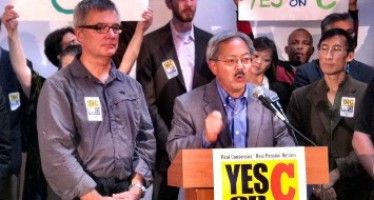St. Louis Fed: There was no recovery
By John Seiler
Gov. Jerry Brown and others have been proclaiming “California is back” because of greater state revenues. But I’ve been warning here all along that the “recovery” is hollow. For one thing, the reduction in “unemployment” has occurred only because millions of people have become discouraged and quit looking for jobs.
Now a shocking new report from the St. Louis Federal Reserve Bank shows how weak the recovery has been:
“American households have rebuilt less than half of the wealth lost during the recession, leaving them without the spending power to fuel a robust economic recovery, according to a new analysis from the Federal Reserve.
“From the peak of the boom to the bottom of the bust, households watched a total of $16 trillion in wealth disappear amid sinking stock prices and the rubble of the real estate market. Since then, Americans have only been able to recapture 45 percent of that amount on average, after adjusting for inflation and population growth, according to the report from the St. Louis Fed released Thursday.”
I have pointed out how a real recovery cannot occur with Chairman Ben Bernanke’s Federal Reserve Board keeping interest rates at zero percent. Inflation is low at about 2 percent (officially). So the middlec class’s savings are eroding every year by about 2 percent. And that has been going for six years now.
Usually, interest rates are about 2 percentage points above inflation. That allows people to save, invest, grow and start businesses without gambling in the stock market or real estate. You just plunk your money in the local bank or S&L, and it grows at 2 percent a year. Not great, but over time it adds up. You can use the accumulated savings to pay for a kid’s education, build a nest egg or finance a new small business.
But in recent years, doing that has been impossible because the nest egg isn’t growing, but shrinking.
More:
“In addition, the report showed most of the improvement was due to gains in the stock market, which primarily benefit wealthy families. That means the recovery for other households has been even weaker.”
Right. Unless you know how to play the markets, which can be risky, you didn’t have any economic “recovery” at all.
This also means that, when the next recession strikes — and they do every four-six years — it will do so with a weaker underlying economic base than existed when the last recession hit in 2007 and the economic meltdown struck in Sept. 2008.
For California, this is really bad news. It means that the current state and local surpluses are likely to be as fleeting as a Monterey summer breeze. And when the next recession strikes, people and businesses are going to be finding ways to make do on less. One way to do that is to move somewhere that living and doing business is cheaper — where land costs less and taxes are lower. Which is about anywhere outside California.
This isn’t as evident during good times, like now, when profits are rising. But in recessionary times, people move to where they can survive.
Related Articles
Fracking watch: South Africa figures out what CA hasn’t
May 5, 2013 By Chris Reed In early 2011, the government of South Africa imposed a moratorium on fracking —
Sales Tax Hike Expires This Week!
Katy Grimes: Finally some good news! California’s 1% sales tax surcharge is set to expire Friday, July 1 making our
Ruling on pension bonuses shows obstacles to CA reform
Providing bonus checks to government retirees when pension funds have good years has long been common and controversial around California.




